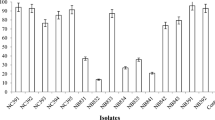Abstract
A psychrotrophic petroleum-degrading bacterium Pseudoalteromonas sp. P29 was isolated from marine sediment, which was collected during 2nd Chinese Arctic Scientific Expedition. The phenotypic character and biodegradation efficiency on mixed oil or vacuum oil were tested at low temperature. The strain Pseudoalteromonas sp. P29 grew in a range of temperature from 5 to 35°C and the optimum temperature was 25°C. Gas chromatography analysis indicated that the strain might preferentially metabolize shorter-chain alkanes. The biodegradation efficiency were nearly 90 and 80%, respectively, after incubation at 5°C for 28 days in the mineral medium supplement with mixed oil or vacuum oil as the sole carbon and energy source. The results showed a possible exploitation of the strain in future biotechnological processes especially in cold contaminated environments.




Similar content being viewed by others
References
Aislabie F, Foght J, Saul D (2000) Aromatic hydrocarbon degrading bacteria from soil near Scott base, Antarctic. Polar Biol 23:183–188
Aislabie JM, Balks MR, Foght JM et al (2004) Hydrocarbon spills on Antarctic soils: effects and management. Environ Sci Technol 38:1265–1274
Aislabie J, Saul DJ, Fonght JM (2006) Bioremediation of hydrocarbon-contaminated polar soils. Extremophiles 10:171–179
Brakstad OG, Bonaunet K (2006) Biodegradation of petroleum hydrocarbon in seawater at low temperatures (0–5°C) and bacterial communities associated with degradation. Biodegradation 17:71–82
Deppe U, Richnow H, Michaelis W (2005) Degradation of crude oil by an Arctic microbial consortium. Extremophiles 9:461–470
Geerdink MJ, van Loosdrect MCM, Luyben KchAM (1996) Biodegradability of diesel oil. Biodegradation 7:73–81
Lin XZ, Shen JH, Du N et al (2009) Screening and phylogenetic analysis of petroleum-degrading bacteria in sediments from Arctic Ocean. Acta Scientae Circumstantiae 29(3):536–541 (in Chinese)
Lindstrom JE, Braddock JF (2002) Biodegradation of petroleum hydrocarbons at low temperature in the presence of dispersant Corexit 9500. Mar Pollut Bull 44:739–747
Ma YF, Wang L, Shao ZZ (2006) Pseudomonas, the dominant polycyclic aromatic hydrocarbon-degrading bacteria isolated from Antarctic soils and the role of large plasmids in horizontal transfer. Environ Microbiol 8(3):455–465
Margesin R, Gander S, Zacke G et al (2003) Hydrocarbon degradation and enzyme activities of cold-adapted bacteria and yeasts. Extremophile 7:451–458
Michaud L, Giudice AL, Saitta M et al (2004) The biodegradation efficiency on diesel oil by two psychrotrophic Antarctic marine bacteria during a two-month-long experiment. Mar Pollut Bull 49:405–409
Morita RY (1975) Psychrophilic bacteria. Bacteriol Rev 39:144–176
Pepi M, Cesaro A, Liut G et al (2005) An antarctic psychrotrophic bacterium Halomonas sp. ANT-3b, growing on n-hexadecane, produces a new emulsifying glycolipid. FEMS Microbiol Ecol 53:157–166
Raghuukumar C, Vipparty V, David JJ et al (2001) Degradation of crude oil by marine cyanobacteria. Appl Microbiol Biotechnol 57:433–436
Rike AG, Haugen KB, Borresen M et al (2003) In situ biodegradation of petroleum hydrocarbons in frozen Arctic soils. Cold Reg Sci Technol 37:97–120
Stallwood B, Shears J, Williams PA et al (2005) Low temperature bioremediation of oil-contaminated soil using biostimulation and bioaugmentation with a Pseudomonas sp. from maritime Antarctic. J Appl Microbiol 99:794–802
van Hamme JD, Odumeru IA, Ward OP (2000) Community dynamics of a mixed-bacterial culture growing on petroleum hydrocarbons in batch culture. Can J Microbiol 46:441–450
Venosa AD, Zhu XQ (2003) Biodegradation of crude oil contaminating marine shorelines and freshwater wetlands. Spill Sci Technol Bull 8(2):163–178
Whyte LG, Hwarii J, Zhou E et al (1998) Biodegradation of variable-chain-length alkanes at low temperatures by a psychrotrophic Rhodoccoccus sp. Appl Environ Microbiol 64(7):2578–2584
Whyte LG, Goalen B, Hawari J et al (2001) Bioremediation treatability assessment of hydrocarbon-contaminated soils from Eureka, Nunavut. Cold Reg Sci Technol 32:121–132
Acknowledgments
This research was supported by grants of Polar Science Research Foundation of China and National Natural Science Foundation of China (No.40576060).
Author information
Authors and Affiliations
Corresponding author
Rights and permissions
About this article
Cite this article
Lin, X., Yang, B., Shen, J. et al. Biodegradation of Crude Oil by an Arctic Psychrotrophic Bacterium Pseudoalteromomas sp. P29. Curr Microbiol 59, 341–345 (2009). https://doi.org/10.1007/s00284-009-9440-9
Received:
Revised:
Accepted:
Published:
Issue Date:
DOI: https://doi.org/10.1007/s00284-009-9440-9




